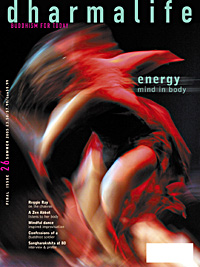Food of Bodhisattvas
Buddhist Teachings on Abstaining from Meat
Author: Shabkar
Translator: Padmakara Translation Group Shambhala Publications 2004, $14.95/£10.99p/b, 160pp
Shabkar Tsogdruk Rangdrol (1781-1851) is revered by all schools of Tibetan Buddhism. Living mostly on retreat in the mountains, surrounded by a few close and hardy disciples, or on pilgrimages to the holy places of Tibet, he led an austere life. He had no fixed abode, only the most meagre of possessions, he was attached to no monastery, adhered to no school, and remained free from dependence upon benefactors. Shabkar was famed for his concern for animals, and lived by a strict vegetarian diet - a rare accomplishment in the harsh climate of Tibet. The practice of vegetarianism is still rare, not only in Tibet itself but in Tibetan Buddhism in the West - despite the relative ease of adopting a vegetarian diet here. It is this incongruity that the book addresses.
Food of Bodhisattvas presents two of Shabkar's works along with an introduction by the translators. The introduction is a fascinating work in itself, giving an account of Shabkar and offering an overview of the historical relationship between Buddhism and vegetarianism from a Tibetan perspective. The translators are anything but impartial on vegetarianism, and advocate a meat-free diet as an expression of compassion for living beings.
The first translated text, The Faults of Eating Meat, is a compendium of extracts from Mahayana and tantric scriptures and teachings by Indian and Tibetan masters. These are of interest primarily in giving a sense of how widespread the advocacy of vegetarianism was throughout the Mahayana and Vajrayana world. Many of these texts, such as the Angulimala Sutra, the Sutra of Close Mindfulness, and various tantras, are not readily available to the average western practitioner, and any exposure to them is welcome. Moreover, the wealth of material from authoritative sources may well be effective in motivating followers of Tibetan Buddhism to re-examine their relationship to meat-eating. However, because there is minimal material connecting the extracts, Shabkar's voice and personality are only dimly heard, which I found disappointing.
The second text, The Nectar of Immortality, is an engaging essay in which Shabkar addresses in a more personal way the reasons why meat-eating should be avoided by those following the Bodhisattva path. Many of these arguments are typically Tibetan, such as the idea that all beings have, at some point in the endless rounds of rebirth, been one's own mother, and that in eating meat one is in effect devouring a parent. Shabkar also warns of a hellish rebirth for those who consume meat and tackles the idea that one can benefit a slaughtered animal by 'compassionately' chanting mantras while eating it.
Arguments for or against such propositions will necessarily lack persuasive force for all but the followers of Tibetan Buddhism. However, for a wider audience there are still arguments that may sway opinions. Shabkar writes, for example, that the notion - formulated originally for bhikkhus who lived by accepting whatever was put into their begging bowls - that it's acceptable to eat meat as long as one doesn't see, hear, or suspect that the animal was killed especially for the recipient, is not applicable in a market economy. Instead, he argues, the meat-eater creates the demand that the butcher merely fills. Thus it is the meat-eater who is mostly at fault and who must take responsibility for his actions if he sincerely wishes to reduce the amount of suffering his diet entails.
The fact that many of Shabkar's arguments are framed in a Tibetan world view does not invalidate the book. Shabkar was a Tibetan writing for Tibetans, and his arguments will remain potent for present-day Tibetan practitioners. This book will hopefully encourage more Buddhists in the West (and not just followers of Tibetan schools) to become more aware of the suffering that eating meat entails, and begin moving towards adopting a diet that helps to avoid unnecessary pain for animals.
Bodhipaksha's book, Vegetarianism, is published by Windhorse



